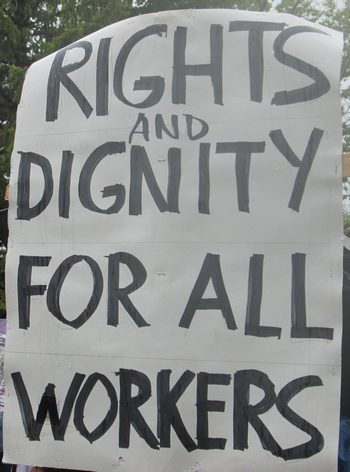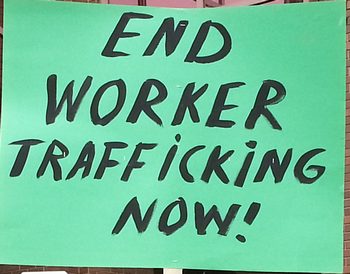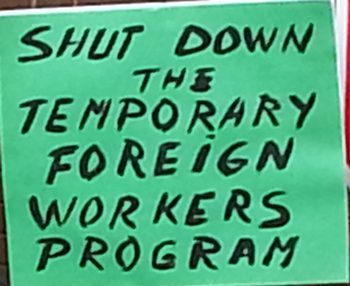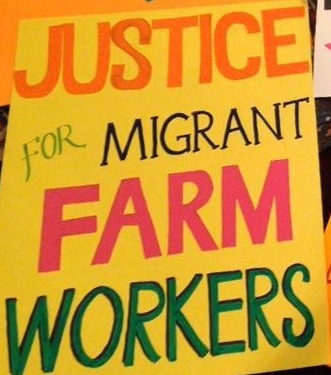|
June 18, 2021 - No. 58
June 20
Join Cross-Country Day of Action
Full and Permanent Immigration
Status for All!
• Permanent Status for All!
• Cross-Country Day
of Action
Conditions of Migrant Workers
• One in Thirty People
on Earth Are International Migrants
• Canada's Reliance on
Migrant Labour
• Essential Services
and Industries Depend on International
Migrants
• The Contribution of
Agricultural Migrant Workers
• With Our Deepest
Condolences
June 20
Join Cross-Country Day of Action
June 20 is World Refugee Day. It was so
designated by the United Nations in 2001 to
commemorate the 50th anniversary of the 1951
Convention Relating to the Status of Refugees.
In Canada, the Migrant Rights Network of
migrant advocacy organizations and Migrante
Canada are marking this occasion to once again
give voice to Canadians' demand for Status for All!
-- for refugees, students, migrant workers and
undocumented people.
 The call for
full and permanent immigration status is a
call for an end to a system of deadly
racialized exclusion from rights, protections
and dignity, Migrante Canada points out.
Referring to the colonial relations Canada
maintains with the Indigenous peoples and the
crime of genocide committed against
them, Migrante writes, amongst other things: The call for
full and permanent immigration status is a
call for an end to a system of deadly
racialized exclusion from rights, protections
and dignity, Migrante Canada points out.
Referring to the colonial relations Canada
maintains with the Indigenous peoples and the
crime of genocide committed against
them, Migrante writes, amongst other things:
"While Canada was created from theft of land,
it now imposes immigration rules to deny
rights to us. Primarily racialized and working
class migrants are excluded from protections
and benefits so that our work can be devalued
for the profit of the super rich.
"This week also marks one year since the
deaths of Bonifacio Eugenio Romero and Rogelio
Muñoz Santos. Virtually nothing has been done
to ensure no more migrant farm workers die
preventable deaths. Already in 2021, at least
nine farm workers have died, six of them in
federally regulated quarantine.
"The call for full and permanent immigration
status is a call for an end to a system of
deadly racialized exclusion from rights,
protections and dignity. As migrants, we must
demand an end to colonial violence within
Canada and throw our support behind struggles
for Indigenous rights and liberation.
"We are not simply asking for rights under
Canadian laws based on colonialism -- we must
challenge the violent and unfair nature of
this whole system. We must join together and
demand that Canadian laws and policies do not
force more people out of their homes anywhere.
"That is why on June 20th -- World Refugee
Day and Father's Day -- we will take action
for full and permanent immigration status for
all."
"Join or organize an action on June 20th near
you!
"Together, we will win!"
Join in actions taking place across the
country on June 20. Visit the website of the
organizers to find out about and support
events in your area: MigrantRights.ca.

The Migrant Rights Network is organizing a
day of action on the occasion of World Refugee
Day to once more call on the Trudeau
government to ensure full and permanent
immigration status for all without exception.
The federal government's "pathway to permanent
residency" for 90,000 people introduced in May
2021 was the result of migrant rights
activists across the country speaking out and
organizing. The time is now to build on the
one year of work since the Migrant Rights
Network launched its call for full and
permanent immigration status for all.
Notwithstanding the recent measures that have
resulted in status for some, the vast majority
of working class, racialized and particularly
undocumented people are shut out of permanent
resident status. As a result, they live
without income support, workplace rights or
even access to health care in a pandemic. They
live under constant threat of deportation. The
measures the government has taken have opened
the door a crack, migrant workers and their
allies are pushing ahead to make space for
everyone.
Join an action on June 20th near you or
organize one!

Conditions of Migrant Workers
 According to
the United Nations World Migration Report
2020, there were approximately 25.9 million
refugees globally as of 2018. Palestinians
registered with United Nations Relief
organizations accounted for 5.5 million of
that total. According to
the United Nations World Migration Report
2020, there were approximately 25.9 million
refugees globally as of 2018. Palestinians
registered with United Nations Relief
organizations accounted for 5.5 million of
that total.
While 25.9 million is a large number, it is
less than 10 per cent of the estimated 272
million international migrants in the world in
2019. Out of a global population of 7.7
billion, it means one in every 30 people on
earth is an international migrant. It is a
staggering statistic. But these are living
breathing human beings, with legitimate claims
upon society to affirm and guarantee their
rights wherever they are, not just where they
were born.
India had the largest number of migrants
living abroad, 17.5 million people, followed
by Mexico and China with 11.8 million and 10.7
million respectively. The top destination
country, with 50.7 million international
migrants now calling it home, is the United
States. It has been so since 1970. Germany,
which in 2019 was home to 13.1 million
international migrants, is a distant second to
the U.S. Regionally, Europe and Asia host 82
million and 84 million international migrants
respectively, 61 per cent of the total, while
North America collectively accounts for 22 per
cent and Africa, 10 per cent.
 Economic
insecurity is the leading reason why people
leave their homes, in search of employment and
stability. War, violence and oppression is
second to economic insecurity. This phenomenon
of hundreds of millions compelled to become
international migrants is clearly an
expression of a global social order that rains
catastrophe down upon the peoples of the
world. Economic
insecurity is the leading reason why people
leave their homes, in search of employment and
stability. War, violence and oppression is
second to economic insecurity. This phenomenon
of hundreds of millions compelled to become
international migrants is clearly an
expression of a global social order that rains
catastrophe down upon the peoples of the
world.
It is also the face of a new world in the
making, that which is coming into being, of
the workers of all lands who regardless of
place of origin exist as one working class in
whichever country they are living. Migrants,
regardless of the status imposed upon them,
are part and parcel of the main force for
humanizing the social and natural environment.
They are "essential workers" as we have seen
in Canada during the pandemic. It is in laying
claim to that which belongs to them by virtue
of being human and advancing the fight for the
rights of all that societies will come into
being which uphold the rights of all.

 The Canadian
economy relies upon having hundreds of
thousands of foreign migrants available to do
work that sustains our economy. More than half
of Canada's population has come here from
abroad since World War II. Currently, about 22
per cent of Canada's 34.5 million people were
born abroad. In the five-year period 2011-2015
an average of 258,170 people a year secured
permanent residency while from 2016-2020 the
average was 299,400 per year. Canada raised
its target to 401,000 for 2021. The Canadian
economy relies upon having hundreds of
thousands of foreign migrants available to do
work that sustains our economy. More than half
of Canada's population has come here from
abroad since World War II. Currently, about 22
per cent of Canada's 34.5 million people were
born abroad. In the five-year period 2011-2015
an average of 258,170 people a year secured
permanent residency while from 2016-2020 the
average was 299,400 per year. Canada raised
its target to 401,000 for 2021.
Even more foreign workers are brought as
temporary migrant workers, including those
with a range of skill levels, from post
graduate and university students to
high-skilled and so-called low-skilled
labourers. The Canadian state organizes to
bring them here under a variety of programs,
often under the promise of permission to apply
for permanent residency after arrival. Many
are contracted under employer specific work
permits that only permit the worker to work
for a specific employer. It's akin to
indentured labour.
In 2016, the most current data published by
Statistics Canada, a total of 613,200
temporary work permits were issued. They fall
under two general programs. The Temporary
Foreign Worker Program issues
employer-specific work permits (ESWP). Private
household service workers and agricultural
workers fall under this category. They are
largely at the mercy of the employer and thus
the most vulnerable. Another program called
the International Mobility Program issues open
work permits (OWP) which are not employer
specific.
 The breakdown
of temporary work permits issued in 2016 was
377,700 OWPs; 135,900 high skilled ESWPs;
117,700 post-graduation work permits; 90,800
International Work Experience Canada permits;
77,800 low skilled ESWPs; and 57,600 student
study permits. The rest fall under
miscellaneous categories. The breakdown
of temporary work permits issued in 2016 was
377,700 OWPs; 135,900 high skilled ESWPs;
117,700 post-graduation work permits; 90,800
International Work Experience Canada permits;
77,800 low skilled ESWPs; and 57,600 student
study permits. The rest fall under
miscellaneous categories.
The numbers in every category have steadily
risen since 2001, with one exception --
humanitarian and compassionate work permits.
These have steadily declined from 40,500 in
2001 to 25,700 in 2016. Post-graduation
permits by comparison went from 2,400 in 2001
to 117,700 in 2016, while student study
permits went from 3,900 to 57,600.
Temporary foreign migrant workers are an
integral part of the Canadian working class
and contribute immensely to Canadian society.
The state-organized discrimination and
violation of their rights has to end. No more
platitudes from government officials that the
work they do is "essential" or that "we are
all in this together" while blatantly
discriminating against these most vulnerable
sections of the Canadian working class. Status
for refugees, students, workers and
undocumented people -- Status for All! -- is a
legitimate demand to humanize our society.

 One
way to see the dependence of essential
services and industries on
international migrants is that temporary
foreign workers comprise 30
per cent of the workforce in 17 per cent of
all employers in private
household services and 10 per cent of all
employers at gas stations, in
food services and at drinking establishments;
6.6 per cent of all food
and beverage stores; 5.2 per cent of real
estate companies; 4.3 per
cent of businesses in accommodation services
and 4.2 per cent of all
food manufacturing firms. One
way to see the dependence of essential
services and industries on
international migrants is that temporary
foreign workers comprise 30
per cent of the workforce in 17 per cent of
all employers in private
household services and 10 per cent of all
employers at gas stations, in
food services and at drinking establishments;
6.6 per cent of all food
and beverage stores; 5.2 per cent of real
estate companies; 4.3 per
cent of businesses in accommodation services
and 4.2 per cent of all
food manufacturing firms.
Looking at these industries as a whole we
find 9.8 per cent of the private household
service industry workers, 8.0 per cent of gas
station workers and 7.2 per cent accommodation
and food service workers are temporary foreign
workers. In administrative and support
services it is 5.8 per cent; animal and
aquaculture production 5.6 per cent; 4.3 per
cent in warehousing and storage; 3.8 per cent
in professional, scientific and technical
services. See Chart 1.

Click to enlarge

 Some industries
rely heavily on temporary foreign workers.
Canada-wide 27.4 per cent of agricultural
workers are foreign migrants. The
concentration is even higher in provinces
where fruit and vegetable production is
centred: 41.6 per cent in Ontario and 30 per
cent in Quebec, British Columbia and Nova
Scotia. Some industries
rely heavily on temporary foreign workers.
Canada-wide 27.4 per cent of agricultural
workers are foreign migrants. The
concentration is even higher in provinces
where fruit and vegetable production is
centred: 41.6 per cent in Ontario and 30 per
cent in Quebec, British Columbia and Nova
Scotia.
The agricultural production in Ontario,
Quebec, BC and Nova Scotia where these workers
are concentrated is a multi-billion dollar
business. For example, 48 per cent of Canada's
field vegetable production is in Ontario and
38 per cent is in Quebec, generating $569
million and $478 million respectively in 2019.
The majority of this production, $729.3
million, is for export.
Seventy-one per cent of greenhouse vegetable
production is concentrated in Ontario:
tomatoes (37 per cent); peppers (32 per cent)
and cucumbers (27 per cent). Seventeen per
cent is in British Columbia and seven per cent
in Quebec, altogether generating $1.032
billion, $305 million and $148 million
respectively. The lion's share of this, $1.108
billion, is for export. Mushroom production is
another huge cash crop for export, generating
$320.4 million. The top export destination of
each of these crops is the United States,
which receives 97 per cent of farm gate
production value.
The same is true of Canada's fruit production
-- 90 per cent of which comes from BC ($467.3
million), Ontario ($303.7 million) and Quebec
($287.2 million). The United States is the top
destination of Canada's fruit exports, taking
64.8 per cent, valued at $546.1 million.
Most agricultural workers come under the
Seasonal Agricultural Worker Program on
employer specific work permits. Their
residency in Canada is restricted to a maximum
period of eight months, between January 1 and
December 15. This program draws on workers
from Mexico and the Caribbean and they must
work in specified crop production: apiary
products, fruit and vegetable, mushrooms,
flowers, nursery-grown trees, pedigreed canola
seed, seed corn, grains, oil seeds, maple
syrup, sod, tobacco, bovine, dairy, duck,
horse, mink, poultry, sheep, or swine.
 Many of these
workers return year after year, working for
the same employer, and while they may be
eligible to apply for permanent resident
status, the requirement bar is set high so as
to prohibit most of these migrant workers from
ever obtaining permanent status, should they
want to do so. It is not much different than
when Canada's racist immigration practices,
while not outright excluding people from the
Caribbean or Africa from applying for
citizenship, made the process impossible for
them to navigate successfully. Many of these
workers return year after year, working for
the same employer, and while they may be
eligible to apply for permanent resident
status, the requirement bar is set high so as
to prohibit most of these migrant workers from
ever obtaining permanent status, should they
want to do so. It is not much different than
when Canada's racist immigration practices,
while not outright excluding people from the
Caribbean or Africa from applying for
citizenship, made the process impossible for
them to navigate successfully.
The Canadian Council for Refugees published a
report on a National Forum on Human
Trafficking held November 27, 2019 which
discussed the conditions of these workers.
Among other things it wrote: "Those who come
to Canada through the low-skilled stream of
the TFWP [Temporary Foreign Worker Program]
are at particular risk. They are not allowed
to bring their families, they have little
access to services offered by large settlement
agencies, are often placed in communal living
situations, and often with strangers. These
situations create many unintended consequences
on mental health; many live with anxiety and
depression. Their situation also affects their
relationships with their families."
The report continued: "Exploitation often
begins with the recruiter. This often takes
the form of exorbitant recruitment fees as
well as abusive and fraudulent practices.
Forum participants reported workers being
charged $10,000 by recruiters at the onset of
their contracts; there have even been cases of
workers being asked to pay $50,000 (for
airfares, wage deductions, etc.)." The
participants called for stronger measures to
be put in place to deter, monitor and provide
consequences for abusive recruiters.


Bonifacio
Eugenio Romero, 31 - PRESENTE!
Rogelio Muñoz
Santos, 24 - PRESENTE!
Juan Lopez
Chaparro, 55 - PRESENTE!
Logan Grant, 57
- PRESENTE!
Roberto Jacob
Baca Gomez, 38 - PRESENTE!
Jose Antonio
Coronado, 44 - PRESENTE!
Romario Morgan,
23 - PRESENTE!
Fausto Ramirez
Plazas - PRESENTE!
Aneish
Dalbarry, 29 - PRESENTE!
And the workers
whose names are unknown - PRESENTE!
Migrant Workers Alliance for Change marks one
year since the death from COVID-19 of Ontario
farm worker Bonifacio Eugenio Romero and
honours him and other farm workers who have
died since.
The Alliance states:
"We won’t be safe until we have the power to
protect ourselves and that means full and
permanent immigration status for all!
... As we
grieve the loss of our coworkers and
comrades, we renew our commitment to
organizing for equal rights and justice for
all migrant and undocumented people!"

(To access articles
individually click on the black headline.)
PDF
PREVIOUS ISSUES
| HOME
Website: www.cpcml.ca
Email: office@cpcml.ca
|

